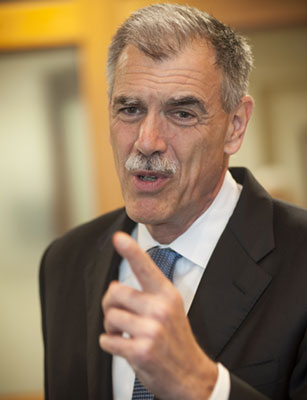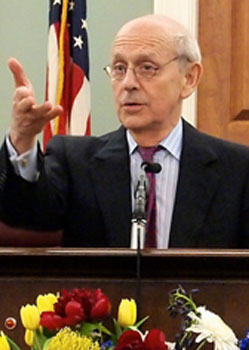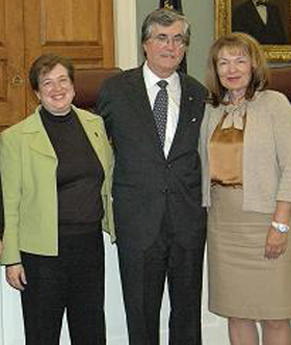The King Lecture Series was created to bring prominent national legal figures to New Hampshire to present on the evolving legal issues and controversies of the time. The following contain a brief summary of some of the speakers and topics that have been presented through this Series since 2008. Your membership support helps to fund these extraordinary events.
Following his remarks, Judge Sutton and Justice James Bassett of the N.H. Supreme Court answered questions from the audience on federal and state constitutional issues.
On September 19, 2017, Judge Jeffrey Sutton, joined by Justice David Souter, shared their views on the role of the state courts and the state constitutions within the framework of our federal constitution. The event was held at the New Hampshire Federal District Court before an audience of about 150 attendees. Judge Sutton, a beloved former Scalia clerk, is now a highly respected conservative judge on the U.S. Court of Appeals for the Sixth Circuit, based in Cincinnati. Judge Sutton was the author of two controversial opinions, one in which he upheld the Affordable Care Act based on previous Supreme Court rulings, and the other, upholding same-sex marriage laws.
Former Supreme Court Justice David Souter has maintained a very low public profile since retiring from the Supreme Court in 2009, but received a lot of attention over prescient remarks on “civic ignorance” he made at a 2012 appearance at another NH Supreme Court Society sponsored event:
“I don’t worry about our losing republican government in the United States because I’m afraid of a foreign invasion. I don’t worry about it because I think there is going to be a coup by the military as has happened in some other places. What I worry about is that when problems are not addressed, people will not know who is responsible. And when the problems get bad enough, as they might do, for example, with another serious terrorist attack, as they might do with another financial meltdown, some one person will come forward and say, ‘Give me total power and I will solve this problem.’
“That is how the Roman republic fell. Augustus became emperor, not because he arrested the Roman Senate. He became emperor because he promised that he would solve problems that were not being solved.
“If we know who is responsible, I have enough faith in the American people to demand performance from those responsible. If we don’t know, we will stay away from the polls. We will not demand it. And the day will come when somebody will come forward and we and the government will in effect say, ‘Take the ball and run with it. Do what you have to do.’
“That is the way democracy dies. And if something is not done to improve the level of civic knowledge, that is what you should worry about at night.”
On October 2, 2015, National Public Radio’s award-winning legal affairs correspondent Nina Totenberg, interviewed by WBUR’s Robin Young, host of Here & Now, spoke to an audience at the Capitol Center for the Arts with observations about the Supreme Court, politics, and a story about the return of her father’s stolen Strativarius violin.
Totenberg said in response to a question from Young that June 2014 was a rare time in her career monitoring the Court. “There are few times when there is that kind of thunderous opinion as same-sex marriage, much less Obamacare 2 and some other important decisions. You could probably count on two hands the number of opinions since 1965 that are of that importance, and that everybody understands from the very beginning are of that importance.”
She shared some personal anecdotes of her encounters with Justices outside of the courtroom, including David Souter, who attended the event.
 On May 16, 2014, then United States Solicitor General Donald Verrilli, Jr. joined members of the New Hampshire Supreme Court and Society members to deliver a King Lecture on some of the more challenging and contentious legal battles recently before the United States Supreme Court. Serving in this role for five years, (stepping down in 2016), Mr. Verrilli will be remembered most for arguing – and winning – two historic US Supreme Court cases on health care law and same-sex marriage.
On May 16, 2014, then United States Solicitor General Donald Verrilli, Jr. joined members of the New Hampshire Supreme Court and Society members to deliver a King Lecture on some of the more challenging and contentious legal battles recently before the United States Supreme Court. Serving in this role for five years, (stepping down in 2016), Mr. Verrilli will be remembered most for arguing – and winning – two historic US Supreme Court cases on health care law and same-sex marriage.
President Obama has credited Mr. Verrilli with “winning landmark cases that moved America forward,” while Attorney General Loretta E. Lynch said in announcing his departure that “Don has been at the center of the foremost legal challenges of our time.” His two most important wins will most likely be remembered as the Supreme Court’s 2012 decision upholding the constitutionality of the Affordable Care Act, and its decision in 2015 declaring a constitutional right to same-sex marriage.
On May 7, 2013, former US Solicitor General Theodore B. Olson and renowned Attorney David Boies, with Guest Moderator NHPR’s Laura Kinoy, presented the King Lecture at the Capitol Center for the Arts as the third major event of the Constitutionally Speaking series. Although it was a wide-ranging discussion, much of it centered on their united challenge to California’s notorious Proposition 8, which banned marriage between same sex couples.
When advocates for marriage equality sought to challenge California’s notorious Proposition 8, they were fortunate to have the support of two of the nation’s preeminent lawyers, David Boies and Theodore B. Olson. Despite the fact that they had argued against one another in the landmark Bush v. Gore case, their commitment to the marriage issue led them to join forces, defending a lower court judgment that struck down Proposition 8 after a nearly five-year battle.
 On May 26, 2011, United States Supreme Court Justice Stephen Breyer joined members of the New Hampshire Supreme Court and Society members to share with us his thoughts about the judiciary and challenges before the highest court in the land. Justice Breyer was elevated to the US Supreme Court by then President Bill Clinton in May 1994. Formerly a professor of law at Harvard Law School and author of many legal text books still in use today, he subsequently served on the DC Circuit Court, then the 1st Circuit Court of Appeals, before being named to the US Supreme Court in 1994.
On May 26, 2011, United States Supreme Court Justice Stephen Breyer joined members of the New Hampshire Supreme Court and Society members to share with us his thoughts about the judiciary and challenges before the highest court in the land. Justice Breyer was elevated to the US Supreme Court by then President Bill Clinton in May 1994. Formerly a professor of law at Harvard Law School and author of many legal text books still in use today, he subsequently served on the DC Circuit Court, then the 1st Circuit Court of Appeals, before being named to the US Supreme Court in 1994.
Justice Breyer is most well known for his pragmatic approach to the interpretation of law and the Constitution, and his powerful challenges to an “originalism” interpretation of the constitution. His judicial philosophy is set forth clearly in his 2005 book entitled Active Liberty: Interpreting Our Democratic Constitution, where he urges judges to interpret legal provisions of the Constitution or statutes in light of the purpose of the text and how well the consequences of specific rulings will fit those purposes. This is in sharp contrast to his former colleague, Justice Antonin Scalia, who urged legal interpretation based upon the original meaning of the text alone.
 On October 6, 2008, then Dean of Harvard Law School and now United States Supreme Court Justice Elena Kagan joined members of the NH Supreme Court and Society members to present the 2008 King Lecture series. Dean Kagan spoke about Harvard’s current curriculum changes that she was seeking to enact, and on the need to change the way lawyers are being trained. Kagan explained that the training of future lawyers “has an effect far beyond both lawyers and the legal profession, extending to every one of you and in fact, to everyone in this country and the world beyond it.”
On October 6, 2008, then Dean of Harvard Law School and now United States Supreme Court Justice Elena Kagan joined members of the NH Supreme Court and Society members to present the 2008 King Lecture series. Dean Kagan spoke about Harvard’s current curriculum changes that she was seeking to enact, and on the need to change the way lawyers are being trained. Kagan explained that the training of future lawyers “has an effect far beyond both lawyers and the legal profession, extending to every one of you and in fact, to everyone in this country and the world beyond it.”
She is thought by many to have transformed Harvard Law School from a harsh environment for students to one more student centric. Soon after her King Lecture, in January 2009, then Dean Kagan was nominated by President Obama to become US Solicitor General, and she served in that role until August 2010, when she was again nominated by President Obama to become a US Supreme Court Justice. Justice Kagan is the fourth female Justice to serve on the US Supreme Court.
